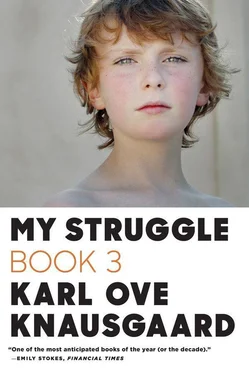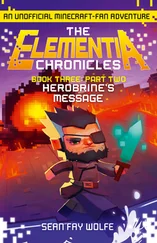“We can just fit this in before we eat,” Dad said. “It’s a kind of magic. My grandmother did it for me when I was small. And it worked. My hands were covered with warts. After a few days they were all gone.”
“What did she do?”
“You’ll see,” he said. He got up, opened the fridge, and took out something wrapped in white paper that he placed on the table and unfolded. There was bacon inside.
“First of all, I’m going to grease your fingers with the bacon. And then we’ll go into the garden and bury the bacon. Then, in a few days’ time, your warts will be gone.”
“Is that true?”
“Yes! That’s what’s so strange! But they do disappear. Just wait and see! Pass me your paws.”
I gave him one hand. He held it in his, took a rasher of bacon, and carefully rubbed it around all the fingers, the palm, and the back of my hand.
“Now the other one,” he said. I gave him my other hand and he took another rasher and did the same. “Have I greased everything now?”
I nodded.
“Let’s go outside then. Now you have to carry the bacon and bury it.”
I followed him downstairs, put my boots on without touching them with my hands — I had the rashers of bacon in them — and walked behind him — he was carrying a spade — around the house into the kitchen garden by the fence bordering the forest. He thrust the spade into the ground, pressed with his foot, and began to dig. After a few minutes he stopped.
“Drop the bacon in there then,” he said.
I did as he said, he filled in the hole, and we left.
“Can I wash my hands now?” I asked.
“Yes, of course,” he said. “The bacon we buried will remove the warts.”
“How long does it take?”
“We-ell … a week or two. It depends on how much you believe.”
After dinner I went into the road. No one was playing soccer any longer, but Geir Håkon, Kent Arne, and Leif Tore were still outside, they were running at the wall alongside the road to see how far they could climb before they fell. If they ran fast enough they managed three, perhaps four, steps before gravity took hold and dragged them down. If they got too far up they landed on their backs, so this was an activity that required caution. I was wary at the first attempt, my only attempt, in fact, because straight afterward Geir Håkon was too ambitious and fell in the ditch with a thump, knocking all the air out of his lungs. He filled them again and let out a loud, tremulous howl while fighting off tears, which purged us of any desire we had to continue.
Geir Håkon got to his feet, averted his face, and, with his back to us, recovered his regular breathing. When he turned, everyone could see he had been crying, but no one said a word.
Why not?
If it had been me, they would have said something.
“What shall we do now?” Kent Arne said.
At that moment Kleppe came down the hill on his bike. He was wobbling from side to side, dressed in a black jacket and black cap, his bloated red features sagging and drooping, a bit like the two B-Max bags he had hanging from either side of the handlebars. He was the father of Håvard, a boy living in the house furthest from ours, who was already seventeen, someone we admired but seldom saw. The father, it was rumored, was a boozer. When he turned into the road where we were I saw my chance. I ran beside him for a little way pretending to be looking inside the bags on the handlebars.
“He’s got beer bottles in the bags!” I shouted to the others and stopped.
Kleppe did not so much as send me a glance. But the others laughed.
The next day we sat in Geir’s bedroom and wrote a love letter to Anne Lisbet. His parents’ house was identical to ours, it had exactly the same rooms, facing in exactly the same directions, but it was still unendingly different, because for them functionality reigned supreme, chairs were above all else comfortable to sit in, not attractive to look at, and the vacuumed, almost mathematically scrupulous, cleanliness that characterized our rooms was utterly absent in their house, with tables and the floor strewn with whatever they happened to be using at that moment. In a way, their lifestyle was integrated into the house. I suppose ours was, too, it was just that ours was different. For Geir’s father, sole control of his tools was unthinkable, quite the contrary, part of the point of how he brought up Geir and Gro was to involve them as much as possible in whatever he was doing. They had a workbench downstairs, where they hammered and planed, glued and sanded, and if we felt like making a soap-box cart, for example, or a go-kart, as we called it, he was our first port of call. Their garden wasn’t beautiful or symmetrical as ours had become after all the hours Dad had spent in it, but more haphazard, created on the functionality principle whereby the compost heap occupied a large space, despite its unappealing exterior, and likewise the stark, rather weed-like potato plants growing in a big patch behind the house where we had a ruler-straight lawn and curved beds of rhododendrons.
Geir’s room was where mine was, his sister, Gro, had her room where Yngve’s was, and his parents had theirs between the two, exactly the same as in our house. Geir walked freely from room to room, ran up and down the stairs, and if he felt like a smørbrød he helped himself to whatever was in the fridge and made one. The same applied to me in his house, I could run between their rooms if I wanted or make myself something to eat with Geir. Often we sat in the living room listening to a Knutsen & Ludvigsen record he had, and laughed at it, or at him, because not only did he know all the lyrics, he could also perform them with the same tones and mannerisms. He was hopeless at soccer, hopeless at all ball games, there was something about his coordination that wasn’t quite right, there was something about his enthusiasm that wasn’t quite right, he never burned with a passion to play, as I often did, and playing soccer on a field for an entire afternoon but still yearning for more when darkness fell and everyone had left was completely alien to him. He wasn’t much good at school, either. He was poor at reading, poor with figures, could seldom reproduce anything he had read or heard in the lesson, though he coped well for all that, nothing depended on soccer or school as far as he was concerned. He was good at imitating people and had started to attract whole crowds around him at school. He liked that, laughter would egg him on to become more and more adventurous, as though it were a kind of fuel, but not even that was important to him. He seemed to have his own small worlds. Such as drawing. He could sit for a whole day in his room drawing. Or building model airplanes, which he often did. His laughter was raucous and it could turn hysterical. Perhaps more than anything else, he liked farting; at any rate there was a lot of experimentation and discussion about it.
Having an older sister was perhaps the reason he wasn’t drawn to the girls’ world in the same way that I was, not initially anyway. But the idea of a love letter excited him. I would write the letter and he would add a drawing, which showed a boy trampling on a heart and two boys standing by watching. Beneath it I wrote in a red felt pen, Eivind breaking our hearts. The letter itself consisted of five lines.
Dear Anne Lisbet
Our hearts are broken
Come back to us
Can you hear
We love you so much
We couldn’t hand this letter and the drawing to her. For all we knew, she might show them to people, perhaps even people at school, and then we would become a laughingstock. Instead we decided to show them to her. With the letter and drawing rolled up like a treaty in our hands, we walked to her house. Up along the rock from Fru Hjellen’s, into her garden, under her window. We threw some gravel up and she appeared. First we held the drawing and the letter up for her to see, then we tore them into pieces and stamped on them, and then we walked off. Now at least she knew how we felt. Now it was up to her.
Читать дальше












